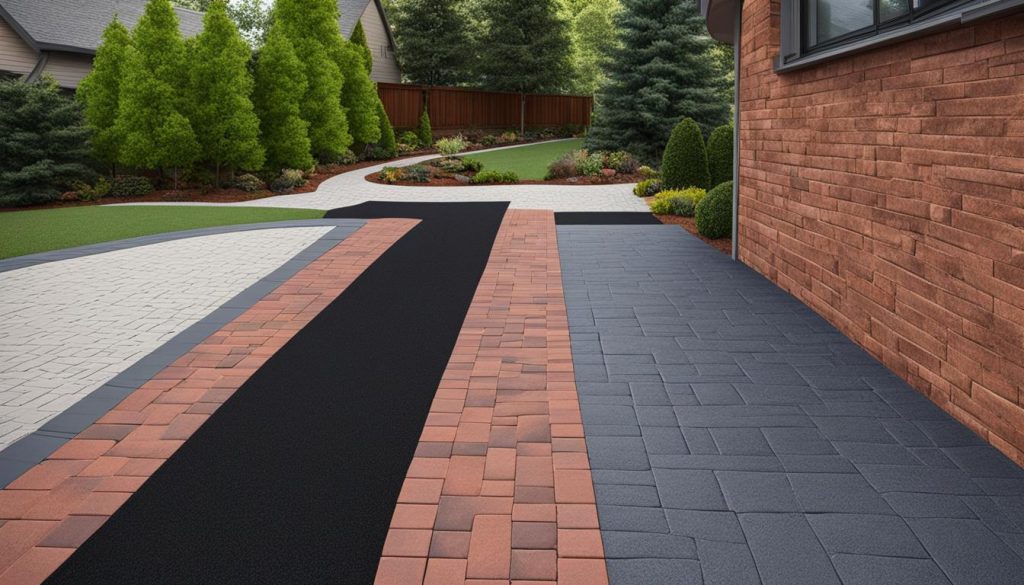Welcome to our article where we will compare interlocking driveways with asphalt driveways and help you determine which one is best for your Canadian home. With winter just around the corner, it’s essential to have a durable and safe driveway. Let’s examine the advantages and disadvantages of each option.
When it comes to driveways, there are two popular options in Canada: interlocking driveways and asphalt driveways. Each has its unique features, benefits, and drawbacks. In this article, we’ll provide you with a comprehensive guide to help you decide which option is right for you.
So, whether you are renovating your old driveway or planning to install a new one, read on to discover the pros and cons of interlocking and asphalt driveways.
Let’s get started!
What are Interlocking Driveways?
At first glance, interlocking driveways may look like traditional paved driveways, but they are constructed using individual pavers or bricks that interlock to create a solid surface. This method of installation makes them more flexible than traditional driveways, as they can be easily repaired or replaced if any damage occurs to individual pavers.
The pavers used in interlocking driveways come in a variety of materials, including concrete, clay, and natural stone, each with its unique texture and appearance. This variety gives homeowners the freedom to choose a style that best suits their home’s overall aesthetic.

What are Interlocking Driveways Made of?
Interlocking driveways are made up of individual pavers or bricks that are typically made of concrete or clay. Natural stone is also used in some cases but is more expensive. The pavers are held together by a layer of sand, which is also used to fill the gaps between them. This layer of sand allows for flexibility and helps to prevent cracking or shifting over time.
How are Interlocking Driveways Installed?
The installation of interlocking driveways requires a solid base to be laid out, typically made of compacted gravel or limestone screenings. Once the base is laid, a layer of sand is added, and the individual pavers are installed in the desired pattern. Once all the pavers are in place, more sand is added and brushed into the gaps between them, locking them into place. The final step is compacting the entire surface to ensure its stability.
Advantages of Interlocking Driveways
When it comes to choosing a driveway for your Canadian home, there are many options to consider. However, interlocking driveways offer several unique advantages that make them a popular choice among homeowners. Here are some of the benefits of choosing an interlocking driveway:
Durability and Resistance to Cracking
Interlocking driveways are highly durable and resistant to cracking or crumbling, making them an ideal choice for Canadian climates. Unlike asphalt driveways, which can develop cracks over time due to freeze-thaw cycles and heavy loads, interlocking driveways maintain their structural integrity and can last for many years with proper maintenance.

Excellent Traction
Interlocking driveways provide excellent traction, reducing the risk of accidents on slippery surfaces. The pavers or bricks used to construct interlocking driveways create a textured surface that offers superior grip compared to smooth asphalt surfaces. This can be especially important during the winter months, when icy conditions can make it difficult to safely navigate a driveway.
Wide Variety of Styles, Colors, and Patterns
Interlocking driveways come in a wide variety of styles, colors, and patterns, allowing homeowners to create a unique and personalized look. Whether you prefer a classic herringbone pattern or an intricate mosaic design, there are many options to choose from that can complement the style of your home and enhance its curb appeal.
Flexibility and Ease of Repair
Interlocking driveways offer flexibility, as they can be easily repaired or replaced if any damage occurs to individual pavers. Unlike asphalt driveways, which require large sections to be replaced if they become damaged, interlocking driveways can be repaired on a smaller scale. This can save homeowners money in the long run, as they won’t have to pay for the cost of a full driveway replacement if only a small section is damaged.
Overall, interlocking driveways offer many advantages that make them a great choice for Canadian homeowners. From their durability and traction to their wide variety of styles and ease of repair, interlocking driveways are a reliable and attractive option for any home.
Disadvantages of Interlocking Driveways
While there are many benefits to interlocking driveways, there are also a few downsides to consider before deciding if it’s the right choice for you and your home. Here are some of the main disadvantages to keep in mind:
- Higher installation cost: Interlocking driveways require a solid base and careful installation. This can increase the upfront cost compared to asphalt driveways.
- Maintenance: While maintenance for interlocking driveways is relatively low, it’s important to note that weeds or grass may grow between individual pavers over time, requiring regular attention to keep the driveway looking its best.
Here’s a side-by-side comparison of the pros and cons of interlocking driveways versus asphalt driveways:
| Interlocking Driveways | Asphalt Driveways | |
|---|---|---|
| Installation cost | Higher | Lower |
| Durability | Highly resistant to cracking and crumbling | Can crack or deteriorate over time without sealcoating |
| Maintenance | Low | Requires periodic sealcoating |
| Aesthetics | Wide variety of styles, colors, and patterns | Generally a plain, black surface |
| Traction | Excellent | Somewhat slippery when wet or icy |
As you can see, there are pros and cons to both interlocking and asphalt driveways. While interlocking driveways may be more expensive upfront and require regular maintenance, they offer exceptional durability, versatility, and aesthetics. Ultimately, the choice depends on your specific needs and budget.

What are Asphalt Driveways?
Asphalt driveways are a popular choice for Canadian homeowners due to their affordability and durability. They are made by using a mixture of asphalt, aggregate, sand, and other materials, which are then compacted and smoothed to create a solid surface. Asphalt driveways have been used in Canada for decades and remain a popular choice for their longevity and ease of maintenance.

Advantages of Asphalt Driveways
Asphalt driveways offer several advantages to Canadian homeowners. Firstly, they have a relatively low installation cost compared to other types of driveways, including interlocking driveways. Additionally, asphalt driveways require minimal maintenance and can often be repaired by adding a new layer of asphalt to any damaged areas. They are also highly resistant to harsh weather conditions and can easily withstand heavy loads, making them ideal for Canadian winters.
- Low installation cost compared to other options.
- Minimal maintenance required.
- Resistant to weather conditions and heavy loads.
Disadvantages of Asphalt Driveways
Despite their many benefits, asphalt driveways also have some drawbacks. One of the main disadvantages is their tendency to fade over time, which can be unsightly and may require sealcoating to restore the pavement’s appearance. Additionally, asphalt driveways are susceptible to oil and gas stains, which can be difficult to remove and may require professional cleaning.
| Advantages | Disadvantages |
|---|---|
| Low installation cost | Fading over time |
| Minimal maintenance required | Susceptible to oil and gas stains |
| Resistant to harsh weather conditions and heavy loads |
In conclusion, asphalt driveways are an affordable and durable option for Canadian homeowners. While they may require some maintenance over time, they remain a popular choice due to their longevity and resistance to harsh weather conditions. However, homeowners should carefully consider their individual needs and preferences before making a decision on which type of driveway to choose for their home.
Pros and Cons of Asphalt Driveways
Asphalt driveways are a popular and cost-effective option for Canadian homeowners. They offer several benefits, but also have some disadvantages that should be considered before making a decision.
Pros of Asphalt Driveways
One of the main advantages of asphalt driveways is their relatively low installation cost compared to interlocking driveways. They are also easier to install than interlocking driveways, taking less time and requiring fewer materials and equipment. Additionally, asphalt driveways are easy to maintain and repair. Damaged sections can be patched or resurfaced, extending the lifespan of the driveway.
Another benefit of asphalt driveways is their ability to withstand heavy loads and harsh weather conditions. They are less prone to cracking or crumbling than other driveway materials, making them ideal for Canadian climates.
Cons of Asphalt Driveways
One of the main disadvantages of asphalt driveways is their lower aesthetic appeal compared to interlocking driveways. Asphalt driveways have a uniform black appearance, while interlocking driveways come in a wide variety of styles, colors, and patterns.
Another drawback of asphalt driveways is the need for regular maintenance. To prevent cracking or deterioration over time, asphalt driveways may require more frequent maintenance in the form of sealcoating. This can add to the long-term cost of the driveway.
Ultimately, the decision between interlocking and asphalt driveways depends on a variety of factors, including budget, aesthetic preferences, and maintenance requirements. We recommend consulting with a professional contractor to help determine which option is best for your Canadian home.
FAQ
What are the main differences between interlocking driveways and asphalt driveways?
Interlocking driveways are constructed using individual pavers or bricks that interlock to create a solid surface, while asphalt driveways are made of a mixture of asphalt, aggregate, and other materials. Interlocking driveways offer flexibility in terms of repairs and replacements, while asphalt driveways are known for their cost-effectiveness.
What are the advantages of interlocking driveways?
Interlocking driveways are highly durable and resistant to cracking or crumbling, making them suitable for Canadian climates. They also provide excellent traction, reducing the risk of accidents on slippery surfaces. Additionally, they come in a wide variety of styles, colors, and patterns, allowing homeowners to create a unique and personalized look.
What are the disadvantages of interlocking driveways?
One main disadvantage is the higher installation cost compared to asphalt driveways. Interlocking driveways require a solid base and careful installation, which can increase upfront expenses. Additionally, weeds or grass may grow between the pavers over time, requiring regular maintenance.
What are asphalt driveways?
Asphalt driveways are constructed with a mixture of asphalt, aggregate, and other materials, creating a smooth and durable surface. They are known for their ability to withstand heavy loads and harsh weather conditions.
What are the pros and cons of asphalt driveways?
One of the main benefits of asphalt driveways is their relatively low installation cost compared to interlocking driveways. They are also easy to maintain and repair, as damaged sections can be patched or resurfaced. However, asphalt driveways may require more frequent maintenance, such as sealcoating, to prevent cracking or deterioration over time.

